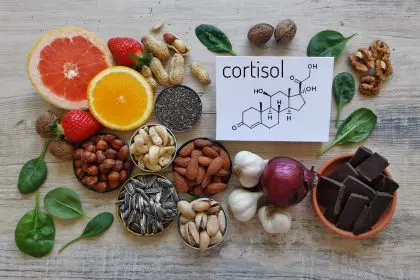You’ve just shared your exciting pregnancy news, and almost immediately the comments start rolling in. “You’re eating for two now!” your well-meaning aunt declares as she slides an extra slice of cake onto your plate. It’s perhaps the most repeated pregnancy nutrition advice of all time, passed down through generations of women. But this seemingly innocent encouragement to indulge could actually be setting you up for pregnancy complications, difficult deliveries, and even long-term health issues for your baby. The science is clear, and it’s time to bust this persistent myth once and for all.
The mathematical mistake behind ‘eating for two’
The logic behind “eating for two” seems straightforward enough. You’re growing an entire human being inside you, so surely you need to eat enough for both of you, right? But this thinking overlooks one critical fact, the relative size difference between you and your developing baby.
During the crucial first trimester, when your baby’s organs are forming, your little one is tiny, starting as a microscopic cluster of cells and growing to about the size of a lime by week 12. At this stage, your calorie needs barely increase at all, despite this being a critical period for development. The nutrients you consume matter far more than the quantity.
By the second trimester, your calorie needs do increase, but only by about 340 calories per day. That’s roughly equivalent to a glass of milk and half a sandwich, not a full extra meal. The third trimester bumps this up to approximately 450 additional calories daily, still nowhere near double your normal intake.
When you do the actual math, pregnancy increases your calorie needs by only about 15-20% overall, not the 100% that “eating for two” implies. This misunderstanding leads many pregnant women to consume far more than their bodies and babies actually need, with potentially serious consequences.
The weighty consequences of overindulging
Gaining too much weight during pregnancy isn’t just about how you’ll look in your maternity photos or how quickly you’ll fit back into your pre-pregnancy jeans. Excessive pregnancy weight gain is linked to serious health complications for both mother and baby.
Women who gain more than the recommended amount face higher risks of gestational diabetes, high blood pressure, and preeclampsia, a potentially dangerous condition characterized by protein in the urine and often severe swelling. These complications can turn a normal pregnancy into a high-risk one, requiring additional monitoring and potentially leading to early delivery.
Labor and delivery also become more complicated with excessive weight gain. Studies show that women who gain too much during pregnancy are more likely to need cesarean sections and face higher risks of delivery complications. Recovery tends to be more difficult and prolonged as well.
The impacts don’t end at birth. Women who gain excessive weight during pregnancy are much more likely to retain significant weight after delivery. What might start as “baby weight” can become permanent weight gain that increases long-term risks of diabetes, heart disease, and other chronic conditions.
Perhaps most concerning are the effects on the baby. Excessive maternal weight gain is linked to higher birth weights, which not only make delivery more difficult but also increase the child’s lifetime risk of obesity, diabetes, and metabolic disorders. It’s a sobering reality that your pregnancy eating habits could affect your child’s health decades into the future.
What your baby actually needs
Growing a healthy human requires far more than just extra calories. Your baby needs specific nutrients in the right amounts at the right times to develop properly. Simply eating more of everything doesn’t address these precise nutritional needs.
Folate is crucial during early pregnancy for proper neural tube development, which forms your baby’s brain and spinal cord. This B vitamin is so important that prenatal supplements contain it, and many foods are fortified with its synthetic form, folic acid.
Iron becomes increasingly important as your pregnancy progresses. Your blood volume increases by about 50% during pregnancy, requiring more iron to make hemoglobin. Meanwhile, your baby is creating their own blood supply and storing iron for after birth.
Calcium and vitamin D work together to build your baby’s skeleton. If your diet doesn’t supply enough, your body will actually pull these minerals from your own bones to ensure your baby gets what they need, potentially weakening your own skeletal system.
Omega-3 fatty acids, particularly DHA, play a vital role in your baby’s brain and eye development. These essential fats must come from your diet and are found primarily in fatty fish, walnuts, flaxseeds, and some fortified foods.
Protein provides the building blocks for your baby’s growing tissues, including organs, muscles, and skin. Your protein needs increase during pregnancy, but most women can meet these needs with modest adjustments to their normal diet.
Notice how none of these crucial nutrients require simply eating twice as much food. Quality, variety, and specific nutrient-dense choices matter far more than sheer quantity when growing a healthy baby.
The new wisdom about pregnancy weight gain
Modern prenatal care includes specific guidelines for weight gain based on your pre-pregnancy body mass index. These evidence-based recommendations aim to support healthy fetal development while minimizing risks.
Women who begin pregnancy at a normal weight are generally advised to gain 25-35 pounds total. Those who start underweight may need to gain slightly more, about 28-40 pounds. Women with overweight or obesity pre-pregnancy are recommended to gain less, typically 15-25 pounds for those with overweight and 11-20 pounds for those with obesity.
These ranges aren’t arbitrary. They reflect the actual physiological changes of pregnancy, including the weight of the baby, placenta, amniotic fluid, increased blood volume, enlarged uterus and breasts, and yes, some additional fat stores to support breastfeeding.
The pattern of weight gain matters too. After modest gains in the first trimester, weight typically increases more steadily during the second and third trimesters. Sudden spikes or stalls in weight gain often warrant discussion with your healthcare provider, as they can signal potential problems.
Rethinking pregnancy appetite
Pregnancy does strange things to your appetite and food preferences. The notorious cravings, aversions, and sometimes extreme hunger are influenced by hormonal changes, altered taste perception, and your body’s changing needs.
Morning sickness, which can actually strike any time of day, affects up to 80% of pregnant women during the first trimester. This nausea and vomiting can make consistent eating difficult and contributes to the relatively lower calorie needs during early pregnancy.
As nausea subsides, many women experience a surge in appetite during the second trimester. This coincides with when your baby begins growing more rapidly, and your calorie needs truly do increase. Honoring this hunger with nutritious choices supports healthy development.
Late in pregnancy, your growing baby puts pressure on your stomach, often causing you to feel full quickly but hungry again soon after eating. Small, frequent meals typically work better than large ones during this time.
Rather than using pregnancy as a time to eat without restraint, try viewing it as an opportunity to become more attuned to your body’s signals and needs. Real hunger, not boredom, tradition, or the license of “eating for two,” should guide your food intake.
Practical approaches to pregnancy nutrition
Rejecting the “eating for two” myth doesn’t mean restricting food or dieting during pregnancy. Instead, it means eating strategically to support your baby’s development and your own health.
Focus on nutrient density rather than calorie counting. Choose foods that deliver maximum nutritional value relative to their calorie content. Colorful fruits and vegetables, lean proteins, whole grains, and healthy fats should form the foundation of your pregnancy diet.
Consider small additions to your normal meals rather than doubling portions. Add a piece of fruit to breakfast, include a yogurt as an afternoon snack, or add a small side salad to dinner. These modest changes can provide the additional calories you need without overloading your system.
Plan your indulgences. Pregnancy cravings are real, and completely denying them can lead to feelings of deprivation or later overindulgence. Allow yourself occasional treats, but try to make them intentional and satisfying rather than mindless additions to an already complete diet.
Stay hydrated. Sometimes thirst masquerades as hunger, and adequate hydration is essential for maintaining proper amniotic fluid levels. Water, milk, and fruit-infused water are better choices than sugary drinks or excessive fruit juice.
The bottom line
The concept of “eating for two” during pregnancy has persisted despite clear evidence that it’s misleading and potentially harmful. Pregnancy nutrition involves nuance, balance, and attention to specific nutrients rather than simply consuming more of everything.
By understanding your body’s actual needs during pregnancy, you can make informed choices that support your baby’s optimal development while protecting your own short and long-term health. The next time someone encourages you to take an extra helping because you’re “eating for two,” you might gently explain that you’re actually eating for one plus a fraction, but with extra attention to quality.
Growing a human is incredible, challenging work. Fueling that process with thoughtful nutrition choices is one of the first and most important parenting decisions you’ll make. Your baby doesn’t need you to eat twice as much, just to eat wisely enough for both of you.














